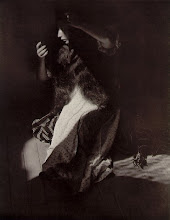Peter Kowald / Miya Masaoka / Gino Robair - Illuminations

PETER KOWALD / MIYA MASAOKA / GINO ROBAIR
Illuminations
Rastascan Records 2004
Download
I suppose Kowald is the big name here – and as ever his presence is colossal – sparking off rich, improvised reactions from the albums two other contributors with his typically dark, abstract bass playing and his wonderful sense of rhythm and texture.
I’ve heard two other albums with the percussion work of Gino Robair – both involving British free improv saxophonist, John Butcher and strangely enough one of these albums also involves the third member of this trio – koto player, Miya Masaoka – the only other album I have heard her play on.
The pieces on offer here are short, succinct, carefully articulated and defined – suggestive of sparsely drawn sketches composed of a few gentle strokes of the brush. They are miniatures of a large, overall image – not that the music itself is either minimal or sparse. Perhaps quiet and unassuming would be better ways of describing the sounds on offer – there are few manic moments – Kowald’s bass delivers deep, rumbling lines that drive things forward, Masaoka’s smooth koto players twinkles in between like a gentle stream flowing over a cluster of rocks as Robair’s unusual percussive work offers mystery and intrigue. His odd assortment of instruments includes things like the faux daxophone (though I’m still not sure at what point I am actually listening to this) and the act of scraping an ebow across various surfaces.
This album is certainly less frantic than the previous two posted here – the lack of a sprawling piano accompaniment places things on a different level where texture often plays a stronger role than colour. The deep bass provides an unusual counterpoint for the higher register of the koto and the careful insertion of the strange sounds of Robair’s electronics and percussion gives the album a kind of otherworldly abstraction and thoughtfulness – not something you always get with free improvisation, which makes it all the more worthwhile to listen to when you do.






